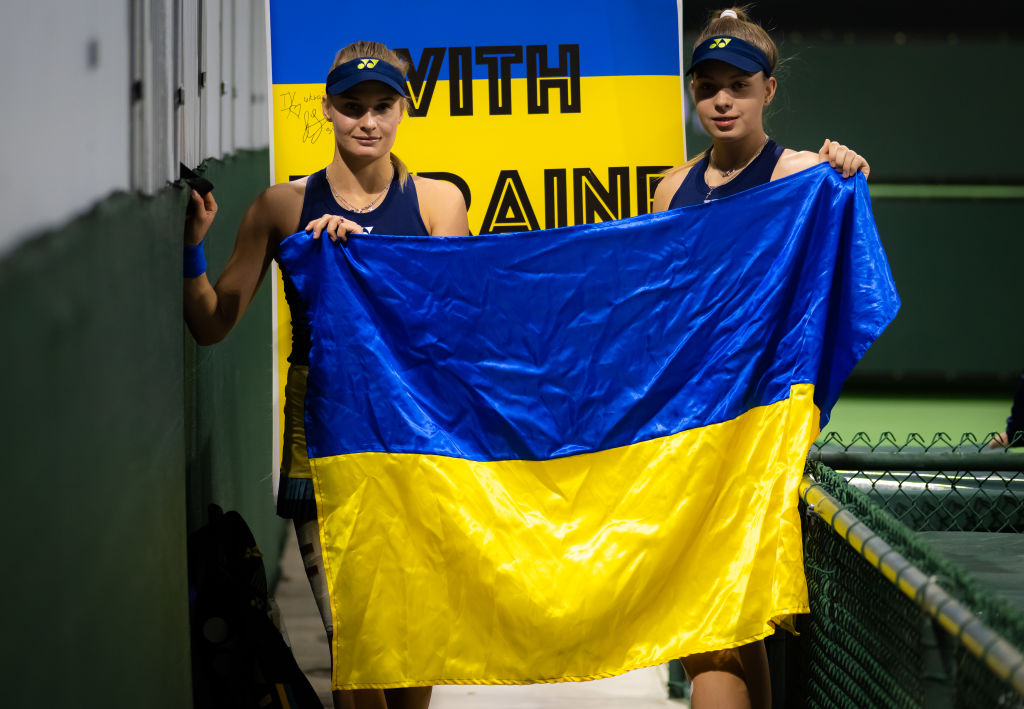
Dayana Yastremska arose from her sleep in Odessa, Ukraine one night in late February, the sound of the bombs rippling through her body. “You kind of think it’s a dream,” she tells TIME. “Then you realize it’s reality.” Russia had begun its invasion of her country. A day later Yastremska, the 93rd-ranked women’s tennis player in the world, and her sister Ivanna, a junior player, hugged their father goodbye in Izmail, where a boat was waiting to take the sisters across the Danube river to Romania. They then got a ride to Bucharest and eventually boarded a flight to France, to complete their escape.
“It was very scary,” says Yastremska, 21. “You don’t know the plans. You have to leave your family. You have to leave your home. You don’t know when you’re going to go back. You don’t know when you’re going to see your parents and how it’s going to end. It was the most emotional day of my life.”
Yastremska is keeping in contact with her parents as best she can, through WhatsApp. But their well-being back in Odessa is never far from her mind. Tennis may seem secondary, but Yastremska and her Ukrainian compatriots will play on; Ukraine faces the United States at a Bille Jean King Cup qualifying event in Asheville, N.C., on April 15-16. The Billie Jean King Cup is the largest annual international team competition in women’s sports: the event culminates in the November finals, held this year in Prague.
The Ukrainian women know they’re competing this weekend for so much more than just themselves. “It’s quite an amazing opportunity for us to come together and play for the country,” says Olga Savchuk, captain of the Ukraine team. Savchuk says that her grandfather, aunt, and dog, Grammy, spent some 11 days in a bomb shelter near Kyiv. “It seems really small, but that’s what we do,” says Savchuk. “To give a little hope and a little attention away from the war, for just a few hours. I know it sounds ridiculous, but hopefully, it will give them something.”
Tennis diplomacy
This weekend’s event will double as a fundraiser for Ukraine. Billie Jean King and her partner, Ilana Kloss, are donating $50,000 to the Ukraine Crisis Relief Fund; title sponsor BNP Paribas has matched that $50,000 gift. The United States Tennis Association (USTA) is pledging to donate 10% of ticket proceeds to Ukraine relief.
At the event, local Asheville artist Andrea Kulish Wilhelm, a first-generation Ukrainian American, will be selling customized “Stand with Ukraine” stickers, as well as Pysanky eggs, which are Ukrainian Easter eggs decorated with beeswax and dyes. Another artist will be selling yellow and blue scarves and donating her profits to the Ukrainian National Women’s League of America.
The tenor of the matches has also changed. Usually, local fans would be encouraged to wrap themselves in “Team USA” patriotism. But organizers are now altering their marketing approach. “We shifted the language from USA versus Ukraine to USA hosts Ukraine,” says Megan Rose, managing director, major events for the USTA. “We felt it was important to kind of have a feeling of hospitality, and not so much that we were against one another.” The American players even treated their Ukrainian opponents to a dinner in Asheville this week; Ukrainian team members each received a gift from the Americans, a blanket with the U.S. and Ukraine flags. The inscription says: “We Stand With You.”
Message served
The Ukrainians appreciated the gesture, another reminder that they’re playing in surreal times. Between practices the players dart toward their phones, to check the latest news headlines or touch base with relatives back home. “It kills you physically,” says Ukraine player Katarina Zavatska. “Even though you’re not in Ukraine, you’re worried every day, every second for your family, all the people in Ukraine. Day by day for me, the court was the only place where I could live my life because there was a ball, there was a racquet, and I just have to hit it and not think about it. It’s the most amazing thing.”
The Russian and Belarusian teams have been suspended from the Billie Jean King Cup competition this year; Russia, as last year’s champion, had already qualified for the finals. Wimbledon reportedly could suspend Russian players like world No. 2 Daniil Medvedev, the reigning U.S. Open champ, if they don’t speak out against Vladimir Putin and the war. Savchuk, for one, supports such strict measures. “My strong position is, if there are sanctions, there have to be sanctions on everyone,” says Savchuk. “Russia has to be isolated. Look at our kids and our families. People dying. Women and children. Russian tennis players at least have to feel uncomfortable.”
Sports can also help keep the war—and the suffering of the Ukrainian people—top of mind. “I want people to know about the situation and not forget about it,” says Savchuk. “These days, in the news, it’s maybe a few weeks people talk about it, and feel sorry about it then people forget and get on with their lives. Which is normal. It’s very human. I get it. But I’m scared and I hope that we try to send a message and talk about our country and more and more people take time and actually investigate the situation.”
Her message for Putin: “Simple and straight, just leave our country. And look into the eyes of your own kids and your family and ask yourself, ‘are you still doing the right thing?'”
More Must-Reads from TIME
- Why Biden Dropped Out
- Ukraine’s Plan to Survive Trump
- The Rise of a New Kind of Parenting Guru
- The Chaos and Commotion of the RNC in Photos
- Why We All Have a Stake in Twisters’ Success
- 8 Eating Habits That Actually Improve Your Sleep
- Welcome to the Noah Lyles Olympics
- Get Our Paris Olympics Newsletter in Your Inbox
Write to Sean Gregory at sean.gregory@time.com